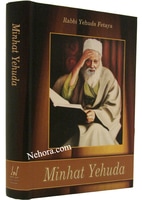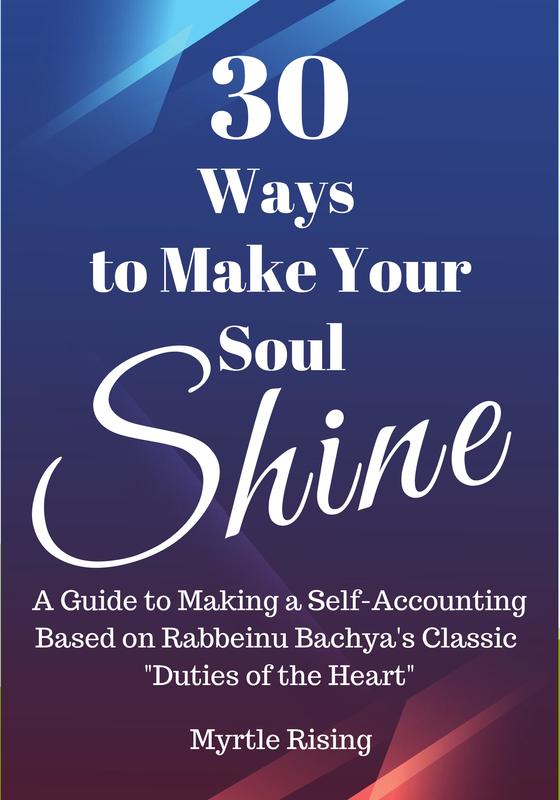
And while I thought, sure, teshuvah is pretty nice, I didn’t feel amazed by the concept.
After all, it made sense:
- You do something wrong.
- We all mess up sometimes.
- So you apologize.
- And then you’re forgiven.
And even though human beings aren’t always so forgiving, no matter how sincerely sorry you are, God sees what’s really in your heart and is anyway above petty ego considerations, so of course HE will forgive you.
But I didn’t realize exactly HOW powerful teshuvah is. It can literally save you from the most terrible things—and I don’t even mean in this physical world.
The book Minchat Yehudah was published by an Iraqi-born mekubal (a great and holy sage thoroughly versed in theoretical and practical kabbalah) named Rabbi Yehudah Petiyah (1859-1942).
Minchat Yehudah contains Rav Petiyah’s elucidations on many aspects of Tanach, Pirkeh Avot, and more.
He asks and answers interesting questions like, “How did the Snake get into Gan Eden in the first place?” and he also describes what goes on behind the scenes, spiritually speaking.
(Transliteration note: My husband and children keep insisting that his name is pronounced peh-TYE-yah, but because the English spellings of his name seem to be written with an "F." Maybe that's because in his native country of Iraq, Arabic-speakers could not pronounce the "P," instead pronouncing it as an "F." The original Hebrew looks like this: פתיה)
In his section on Yechezkel/Ezekiel, he goes into copious detail regarding his experiences with dead spirits, some of whom did such reprehensible things while alive, I can’t describe them here.
In fact, these departed souls were so corrupt that even while dead, they still managed to do reprehensible acts EVEN THOUGH they KNEW they’d immediately be punished with fiery whips by the angels appointed over them.
I know. It’s so bizarre.
Two things struck me as I read over Rav Petiyah’s mind-boggling experiences:
- Teshuvah is vitally important and powerful.
- Rav Petiyah is one of the most compassionate and loving people I’ve ever encountered.
I'll save a discussion of Rav Fetiyah's great compassion for Part II.
Let’s talk about the power of teshuvah first.
What's Worse than Hell?
They were in something called Kaf Hakelah (Slingshot), which is when angelic officials chase them around the world with whips of fire (sometimes for even 200 years) and the only time these spirits find relief occurs when they invade the body of a live human (or animal).
(This is not exact, BTW. We’re limited to using physical 3-dimensional descriptions to describe a spiritual phenomenon occurring outside our narrow 3-dimensional world.)
And actually, even people who were fairly decent in life could still find themselves in this state of Kaf Hakelah if they hadn’t done teshuvah on the things they did do wrong.
(The book gives examples of this too.)
Anyway, these spirits find an opening to possess a person when that person sins in some way.
The big chessed here was that upon being possessed, these people turned to Rav Petiyah, who not only was able to free the person from the blemished spirit, but also effect a tikkun (rectification) on the dead spirit, enabling that soul to eventually enter Gehinnom, and from there, Gan Eden (Heaven, so to speak).
(Sometimes, this necessitated Rav Fetiyah working with this blemished soul for years until he achieved rectification.)
It's both shocking & inspiring to see how teshuvah could even save people from sins so serious and repulsive, most of us could not imagine transgressing in that way.
Yonah: A One-Time Sinner with Major Repercussions
I said to Yonah,
"First of all, please tell me and don’t hide anything from me:
What was your sin that you’ve remained today 15 years in Kaf Hakelah? And who knows how many more years you’ll be in Kaf Hakelah for the same transgression?"
He said to me, “I never sinned all my days except for one time only. And this is how the matter came about:
"For I was an agent between merchants selling raw silk, and blue and purple dyes, to be the go-between for the sellers and buyers. And from this I earned a living for myself and my home. And sometimes a pressing situation arose which required an early visit to the home of the merchants themselves to speak with them.
"And one time it happened that the merchant was not at home and his wife said to me, ‘Sit a while until I’ll send for him to call him.’
"And she sent her maidservant to call her husband and when she sent off her maidservant…and there was nobody with us in the home…and she withdrew 20 shekels and laid it on my chest. And I couldn’t overcome my inclination and I fulfilled her request. And this was my transgression.
"And this is why I’m 15 years in Kaf Hakelah and I don’t know how long I’ll be in this torment because the Beit Din didn’t make it known."
(Perhaps because he caused her to be forbidden to her husband, therefore each time her husband cohabited with her, it was considered a transgression for Yonah in and of itself, and they added to Yonah even more years in Kaf Hakelah because this transgression reaped fruits. And thus the Beit Din didn’t inform Yonah how many years he’ll be in Kaf Hakelah.)
"And because of this transgression alone, I am struck."
I said to him,
“Why didn’t you do teshuvah for this transgression during your lifetime?”
He said to me,
“Because I was embarrassed and ashamed to tell of my crime and sin to a wise man, and I didn’t perform any rectification.”
Nonetheless, implication here is some kind of teshuvah still could have been effective, even for such a sin.
Ephraim: A Shockingly Depraved Sinner Even For Our Time
He described his death to Rav Petiyah, who wrote the following:
A few years later, a quarrel occurred between [Ephraim] and some Yishmaelite donkey drivers.
And when he was transporting some merchandise to Kfar Akuba, these same Yishmaelites ganged up on him and killed him.
And they moved his body outside the village and buried him there and didn’t leave any sign of his burial place.
And they left his donkeys and their load abandoned on the road and didn’t take even one thing from those.
Finally, his brother Shaul went and took the abandoned items and didn’t return anything to the owners.
And he didn’t search for [Ephraim's] body.
And [Shaul] also took all the money and everything that [Ephraim] had in his home, and [Shaul] didn’t pay [Ephraim's] creditors a thing.
And [Shaul] also performed nothing for the gratification of his soul according to the way we are accustomed to do for the dead during the first 12 months.
And because [Ephraim] suffered greatly over this, therefore it caused [Shaul] many obstacles and he lost all his fortune until finally he passed on in a bad way with a very difficult illness.
"And know, that in the place I am buried, there are also other Jews buried there, too. And it has been 17 years since I was killed."
I asked the spirit whether he made teshuvah in the moment he was killed.
He said to me that because he was so panic-stricken, it didn’t occur to him to do teshuvah, and especially since he was an am haaretz, he didn’t even feel the apprehension [that usually ignites a person] to do teshuvah.
He also never put on tzitzit or tefillin all his days, except for 3 times and he didn’t daven except for Yom Kippur.
Ephraim’s story is much more convoluted than what appears here because prior to his lifetime as Ephraim, he also went through several incarnations in which he heaped sin upon sin, and this most recent and putrid lifetime was just one in a long-lasting pattern of depravity.
Yet Rav Petiyah still wanted to know if he’d even managed one moment of mental teshuvah.
Repenting, feeling regret, and expressing this to God is really that powerful.
A Severe Sinner with a Happy Ending: The Power of Teshuvah
Here is the story of a man who committed a sin clearly forbidden in the Torah itself, and one considered particularly reprehensible:
And this I learned from an episode that arrived to me in the year 5683/1922, when one elderly man came to me and said to me that he [committed an uncommon sin of arayos forbidden in the Torah itself] and he cannot undergo fasts and penitential purifications (such as donning a sack and sleeping on ashes and the like of which are all called sigufim/penitential purifications).
I said to him, “Can you not fast at least one day and one night like Yom Kippur?”
And he said yes.
I said to him, “Go and immerse seven immersions before the final meal (because seven immersions are favorable to purify the soul from the tzaraat [spiritual leprosy] within it, as is written about Elisha the Prophet to Naaman the army official, king of Aram; Kings II: 5, 10. And accept upon yourself a fast of 24 hours for the mentioned sin like Yom Kippur (except that you are permitted to perform any kind of malachah). And on the day of the fast, come to me with redemption money equal to 325 fasts and I will perform a rectification for you."
And he did just so.
And because I perceived that this elderly man was a poor man and borrowed the above money from others, therefore I returned to him all the above money as a donation of charity and I did not take from him anything, except 2 pennies only.
And behold, two years later, this same elderly man passed away and I saw him in a dream that he is standing before the Beit Din [Heavenly Tribunal].
And they gazed at him and they saw that he was a baal teshuvah, except that he only did teshuvah on [one main aspect of the cardinal sin], but not on the [other main aspect of the cardinal sin].
And they didn’t speak with him a word regarding that prohibition.
And without speaking or words himself, he entered one room on the side of the court of the Beit Din.
And this room was dark and gloomy, and there wasn’t even a mat to sit on.
And he enters there and sits on his knees in the corner of this room.
And the Beit Din raised their eyes upwards and immediately, 3 angels descended from the heavens above the Beit Din.
And these same angels are called Great Healers Who are Experts in the Wisdom of Surgery.
And they entered the room with the elderly man and closed the door.
And they performed surgery on his organ and removed from there the “rust” and the blemish that had been done to the organ [because of his sin].
And they healed him completely and went out.
I saw until here.
And from this, a person should know the precious beauty of teshuvah!
How it is so great that it saved this same elderly man from several hundreds of years that he should have been sentenced to Kaf Hakelah!
And how many years he should have undergone incarnations as inanimate objects, plants, animals, and people.
And after he would undergo incarnations as inanimate objects, plants, animals, and people, he would enter Gehinnom because the sentence of Gehinnom comes after incarnations as inanimate objects, plants, animals, and people as is written in Shaar Hagilgulim, Introduction 22, page 22 72, and as is copied in his words nearby.
And therefore, our Sages said (Avot 4:17): “How beautiful is one hour of teshuvah and good deeds in This World than all life in the World to Come.”
So what did he do?
He fasted for 24 hours and said a truly remorseful Vidui/Confession, and Rav Petiyah recited a fervent "Yehi Ratzon" over him.
And he didn't even do full teshuvah! His dastardly act was a two-sin transgression, of which he did teshuvah for only one.
It's really, really astounding.
Notably, there are different opinions on fasting (Rebbe Nachman states that hitbodedut—talking directly to God in your own words—is even more powerful and effective than fasting), but to superficially summarize Rav Petiyah’s recommendations:
- fasting (even just once and even just from sunrise to sunset)
- giving tzedakah (with the intent of atonement)
- sincere confession to Hashem accompanied by sincere regret (and regretting the exact sins)
These are very, very powerful in atoning for even particularly ugly sins.
I also can't help wondering about the power of Tikkun Haklali to assist in this.
Rebbe Nachman's designation of 10 specific Psalms (16, 32, 41, 42, 59, 77, 90, 105, 137, 150) are known as the Tikkun Haklali, which is usually translated as "The General Remedy."
But "tikkun" also means rectification, fixing, repair.
Judging by what has been said about the power and deeper meanings of this particular collection of Psalms, it seems like it would be of profound benefit to whoever recites them with as much feeling as possible.
It goes without saying that if at all possible, you should apologize and make amends to anyone you’ve hurt.
It’s very unlikely you’ve done anything anywhere near as corrupt and strange as this elderly man.
(And remember, this was in a time and place where society was more moral and more connected to Torah law. Yet he still transgressed in such a bizarre and disgusting way…)
Please reflect on what this man’s judgement should have been and what great relief happened instead. And he hadn't even done full teshuvah!
This is wonderful hope for each and every one one of us.
May we all succeed in doing complete teshuvah from love.
Go on to Part II
Or skip to Part III
They use it to justify their image of themselves & their modern Jewish community as "an upright Jew" or "perfectly acceptable Jew" (regardless of how lax they are with actual Jewish Law).
Yet it's clear the above examples represent the exception & not the rule.
Many of these souls lived as ignorant Jews. The vast majority of Jews behaved better.
In the entire book, such examples represent a small handful of the vast Jewish community Rav Petiyah served in both Iraq & Eretz Yisrael.


 RSS Feed
RSS Feed
